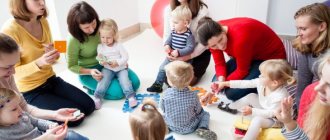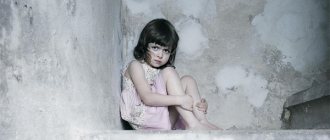Stages of personality formation in preschool age
The formation of personality implies the development of cognitive processes and moral qualities, the formation of a worldview and self-awareness, the development of independence in activity and social activity. This is not a complete list of those features that characterize a person’s personality, but they are the main driving forces in the formation of a child’s personality.
The listed components are laid in preschool age. The active start can be considered 3 years of age, when the child’s self awakens. By the beginning of schooling, personality formation goes through two important stages that contribute to the development of basic age-related characteristics:
- Stage of becoming independent
- Stage of formation of personal initiative.
The first stage of a preschooler’s personal development is aimed at gradually reducing physical dependence on an adult and acquiring independence. The baby repeatedly announces to his parents and grandmothers his need to act on his own. “I myself” sounds in those activities that are interesting to the baby.
The child tries his best. Such an understandable action as folding toys does not interest the baby at all, since it is understandable and feasible. But pouring soup into a plate using a ladle or pinning a pin on a blouse is incredibly exciting!
The second stage involves a transition from the choice that an adult offers the child to the manifestation of one’s own initiative. This is a significant expansion of the boundaries of development. “I want to put together this construction set model,” “I will also water the flowers,” “You know what game I came up with...” - the initiative of older preschoolers extends to all types of activities.
At these stages of a preschooler’s personal development, numerous changes occur. Moral judgments and criteria are developed: what is possible, what is not, what is good and what is bad. Emotional and volitional qualities develop. But in the sphere of personality development, the main achievement of preschool age is independence and initiative.
Personal developments of preschool age
Let us consider in more detail what new formations are formed in the personal development of younger preschoolers, and then in older preschool age.
Changes are especially noticeable during critical age periods. There are two of them in preschool childhood: the 3-year-old crisis, which replaces early childhood with preschool, and the 7-year-old crisis, which precedes the school period.
While the preschooler asserts his own independence, another important new formation is formed in his personal field - will.
The child is persistent in order to be allowed to do a certain action on his own. Having received the consent of the elders, the child most often faces a new obstacle - the matter cannot be argued! The button doesn’t fit into the buttonhole, the bag doesn’t rise, the tower of cubes falls apart...
The difficult task ahead is not to give up, but to try again and again until it succeeds. Therefore, such new formations as independence and will appear at the same stage of personal development.
The emergence of personal initiative awakens the formation of such accompanying new formations as determination and purposefulness.
For many children, it is easier to show initiative than determination. This quality is cultivated if adults encourage the cognitive activity of a preschooler. The child became interested in how a sprout emerges from a seed and took the initiative to plant it next to a houseplant. But then you need to water regularly and wait patiently for the sprout to hatch.
In such situations, the preschooler more often needs support in order to keep the goal in the field of his attention and interest. The child needs the same support if actions are unsuccessful. Along with initiative, to support the child’s desire for goals , since this is a valuable personal quality.
The process of education as the basis for the personal development of children of different ages
The process of comprehensive personality education is labor-intensive. The definition of essence consists of what is included in the understanding of the educational impact on the child. For some it is obedience, for others it is punishment. However, the basis of the upbringing process should be the multilateral development of the child’s abilities and the formation, based on the existing base of natural inclinations, of a harmonious, full-fledged system called personality.
In any situation, the basis of the education process is the family. Its influence is discussed in the works of psychologists and teachers. In the absence of mother and father, this role is assigned to the child’s immediate environment. However, it is in a full-fledged harmonious family that the prerequisites for an adequate personality begin to form, traditions and customs are passed on, which in the future will form a worldview system. The manner of behavior that was a model for him in childhood will be the personal norm throughout the rest of his life. The role of family traditions in the formation of personality is enormous. They allow family values and cultural characteristics to be passed on to subsequent generations, helping to maintain continuity.
For a young child, healthy family relationships are a priority. Rarely does a person as an adult be able to change the existing negative standard. In this case, the person must go through a difficult path of reassessment of values.
Education should not become an end in itself for parents. However, their task is to ensure development in such a way as to create optimal conditions for the purposeful formation of a harmonious personality and prepare it for further life in society. Some parents try to be perfect. You shouldn't be afraid to make mistakes. They are the basis for working on yourself and self-improvement. Moreover, we are talking not only about a child, but also about an adult. Parents must teach their child to be responsible for their actions and take responsibility for their life.
When organizing the education process, you should take into account some features of age-related development. Until the age of three, attention to him and his problems is of great importance for a child. At this age, mother and child are one. Therefore, ignoring requests and appeals is dangerous for mental development. At this age, the child’s cognitive activity is great. Dangerous objects should be excluded from visibility so that the learning process is accompanied only by positive emotions.
After three years, according to ideas in psychology, a child learns to manipulate an adult. Therefore, it is necessary to clearly define the concepts “possible” and “impossible”. The determining system of relations between an adult and a child should be explanatory and contractual. At the age of 5 to 7 years, a child develops fears. The main thing during this period is not to contribute to the development of phobias, but to gently destroy negative emotions.
Development of personal characteristics in communication
Communication with adults and peers creates favorable conditions for the development of the personality of preschool children.
Most of all, children are busy with role-playing games, which involve following the rules prescribed by the plot. Before starting the game, preschoolers assign roles and agree on what rules they will follow.
This teaches diplomacy in communication, develops initiative, but at the same time the ability to coordinate one’s opinion with the opinion of others. The preschooler gets used to taking into account the interests of his peer, and in general perceiving him as a person, and not a mechanical partner in play activities.
In addition to business, moral qualities are laid in communication with peers. The preschooler shows sympathy if another is in pain and seeks to justify a friend if he is threatened with punishment.
The adults with whom the preschooler interacts show him an example of evaluating everything that happens around him. They approve, condemn, simply express their attitude. A child, like a sponge, absorbs such statements and forms his own value guidelines. For example, the only child in the family, who has all the toys at his disposal, will ask permission from a peer to take his car or doll only if adults explain to him.
It is impossible to foresee all situations that are important to teach a child. Therefore, the more a child is included in communication, the more fully his experience and system of moral guidelines will accumulate.
The development of a preschooler’s personality in social terms occurs due to the formation of a system of value orientations and norms of behavior. Internal positions and attitudes are formed. An older preschooler is already guessing how other people will treat him if he does this or that, acts this way or that way.
The Negative Impact of Negative Evaluation
Communication is unthinkable without evaluation. And the statements of adults also help the child form ideas about his capabilities. “You can’t jump off this ladder yet, I’ll help you,” “You can’t take a car from a boy. You will offend him,” “You can’t say that, it’s a bad word.” Such statements include prohibitions and denials, but they indicate important limitations to the preschooler.
Unfortunately, adults use many other types of negative assessments that emphasize the child’s inability and shortcomings. They can be divided into two types:
- Negative assessment of what was done (badly folded the toys, drew them unsightly, spilled the soup again).
- A predictive statement of a negative nature (don’t take it, otherwise you’ll break it; you won’t be able to; you’ll fall again).
Negative assessments of any kind inhibit the activity of a preschooler, distort the child’s opinion about his capabilities, harm the formation of self-esteem and limit personal development.
Game as the main method of personality development of a preschooler
The development of a child is carried out in the course of his upbringing and the various activities that he performs. Among them the following main ones can be distinguished:
- Game activity.
- Household work. This includes a variety of household operations that can be performed by a child.
- Activities between an adult and a child. Teachers and parents organize special activities, exercises and tasks for children to complete, focused on their learning and development.
- Maintaining a daily routine. The child performs certain actions during the day that reflect routine moments: washing in the morning, brushing teeth, eating, sleeping.
Practical situations of humanistic choice.
Preschoolers are faced with a choice : respond to the problems of other children or prefer personal interests and show indifference?
For example, keep the drawing for yourself or include it in a general message to a sick peer; respond to a request for help or ignore it?
The behavior of children in situations of choice helps to better understand the characteristics of their social, moral and emotional development.
2. Practical situations of a problematic nature such as “What to do, what to do?” personality behavior education preschool
These are various difficult situations that we create in order to awaken children’s initiative, independence, intelligence, responsiveness, and willingness to look for the right solutions.
Situations: there are no paints of certain colors, there is not enough plasticine for modeling. Children independently look for solutions and solve problems together.
3. Practical situations “We are the oldest in kindergarten .”
Children learn to take care of children, they develop a sense of self-esteem, a kind attitude towards little ones, and an understanding of their problems.
You can organize the situations “We will delight the kids with gifts made by ourselves”, “We will prepare a concert for the kids”, “We will show a fairy tale”, “We will help make a snow slide”, “We will teach the kids how to dance in circles”.
4. The following situations are like “We are friends with schoolchildren.”
Senior preschoolers gain experience in collaborating with school students: “We are having a sports festival,” “Joint literary quiz in the library,” “We are waiting for our teachers.”
Participation in such situations deepens interest in school and relieves anxiety associated with upcoming schooling. At the same time, valuable experience of inter-age communication is formed, which is important not only for preschoolers, but also for students.
5. Children are very fascinated by situations like “Teach your friend what you can do yourself.”
We encourage children to show attention to each other, mutual assistance and cooperation. Children share their experiences, we help them enter the role of “teacher”, i.e. be patient, attentive and forgiving to the mistakes and difficulties of peers.
6. Children also participate in imitation games : changing emotional and physical states, imitating states of nature, etc.
I would like to emphasize that our constant assistant in the social and personal development of children is the family . Only in cooperation with close adults can high educational results be achieved.
Interaction with family is effective provided there is trust in each other, understanding and acceptance of common goals, methods and means of social and personal development.
It is necessary to instill in a child a love for those closest to him - his home and kindergarten. This is the basis of moral education, the first and important stage.
A child must first of all recognize himself as a member of the family, an integral part of his small homeland, then as a citizen of Russia, and only then as an inhabitant of planet Earth. We go from near to far.
The nervous system and its role in child development
The baby’s nervous system regulates the vital functions of the small organism, ensuring the coordinated functioning of the whole organism. Its main function is the integration and regulation of various processes in connection with changes in the internal and environmental conditions of the baby. The improvement of the nervous system is gradual. In pediatrics, there are different periods. Each of these periods is characterized by its own characteristics. There are certain criteria for the formation of a baby in each period, which make it possible to distinguish between normal and pathological conditions.










